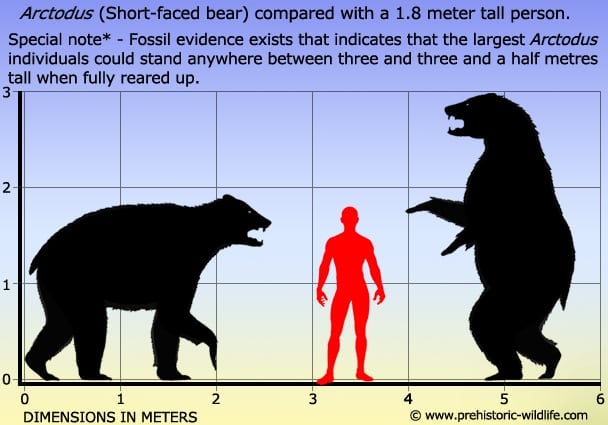Partial jaw of a large, extinct jaguar discovered in a cave in the Ultima Esperanza region of Patagonia. [Credit: Fabiana Martin/CEHA]
Posted on 06/18/2016 2:53:34 PM PDT by SunkenCiv
"Patagonia turns out to be the Rosetta Stone - it shows that human colonisation didn't immediately result in extinctions, but only as long as it stayed cold," says study leader Professor Alan Cooper, ACAD Director. "Instead, more than 1000 years of human occupation passed before a rapid warming event occurred, and then the megafauna were extinct within a hundred years."
The researchers, including from the University of Colorado Boulder, University of New South Wales and University of Magallanes in Patagonia, studied ancient DNA extracted from radiocarbon-dated bones and teeth found in caves across Patagonia, and Tierra del Fuego, to trace the genetic history of the populations. Species such as the South American horse, giant jaguar and sabre-toothed cat, and the enormous one-tonne short-faced bear (the largest land-based mammalian carnivore) were found widely across Patagonia, but seemed to disappear shortly after humans arrived.
The pattern of rapid human colonisation through the Americas, coinciding with contrasting temperature trends in each continent, allowed the researchers to disentangle the relative impact of human arrival and climate change...
The only large species to survive were the ancestors of today's llama and alpaca - the guanaco and vicuna -- and even these species almost went extinct...
"In 1936 Fell's cave, a small rock shelter in Patagonia, was the first site in the world to show that humans had hunted Ice Age megafauna. So it seems appropriate that we're now using the bones from the area to reveal the key role of climate warming, and humans, in the megafaunal extinctions," says Dr Fabiana Martin, at the University of Magallanes.
(Excerpt) Read more at eurekalert.org ...
Partial jaw of a large, extinct jaguar discovered in a cave in the Ultima Esperanza region of Patagonia. [Credit: Fabiana Martin/CEHA]
Flood, Fire, and Famine
in the History of Civilization
by Richard Firestone,
Allen West, and
Simon Warwick-Smith
https://en.wikipedia.org/wiki/Mammoth_steppe
Cro-magnon and their SUV’s warmed the planet so much that they completely wiped out the megafauna’s biome.
I guess there’s nothing to be done but extinct ourselves.
Filet-cro-mignon was probably delicious.
Perhaps the megafauna could not shed body heat efficiently in the warming temperatures and died off.
Frazetta? Painted it like he had lived it.
Nothing like clear thinking and logic to ruin the thread...
More like the elites created an overwhelming demand for fur clothing...when there was not any real need...and no PETA to stop the ensuing massacre.
You are closer to the truth than you realize. Cold climates make mega fauna more efficient as body mass increases faster than surface area as an animal grows larger. Thus cold temperatures do not consume as much metabolic energy as a small body trying to stay warm. Blue Whales, the largest animal on earth range from the arctic to the equator. Their biggest problem is not the cold of the arctic but getting rid of body heat in the tropics.
It also makes them susceptible to the Man-Dog predator team.
Dogs track and run the prey to exhaustion, and hold them umtil the men come up and kill them with standoff weapons like spears and bows.
It is an incredibly efficient hunting machine.
Described to me by Dr. Smythe doing research on a grant from the Smithsonian, while I was in Panama.

My buddy in Basic Training could draw this stuff with an Ink Pen ... he was so Talented...
But, in today’s world of climate change funding, IF yo can link a “problem” - ANY problem, ANY symptom, ANY assumption of ANY future potential problem - to “climate change”.... you get published.
You get money.
You get a bigger budget next year.
Your school and your department head get a bigger budget next year.
Is their conclusion true? The cave bear “sweat to death” and so went extinct? That is, afterall, what they are claiming.
The giant beaver in what is now Ohio is also impressive.

Perhaps warmer temperature meant that humans were better able to survive, shorter winter starvation periods. Thus hunting more large animals who may have been having trouble with the warmer temperatures as suggested. Probably both causes and others not yet mentioned.
Disclaimer: Opinions posted on Free Republic are those of the individual posters and do not necessarily represent the opinion of Free Republic or its management. All materials posted herein are protected by copyright law and the exemption for fair use of copyrighted works.